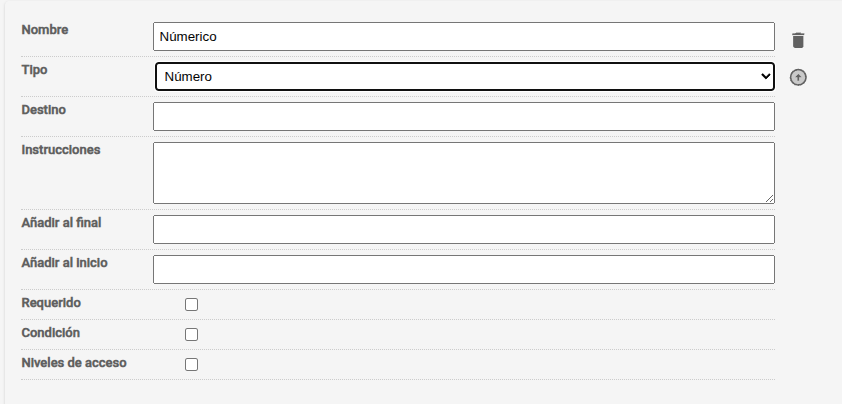The Number Field
The Number field is specifically designed to capture numeric values with automatic validation.
Field Structure
Section titled “Field Structure”Name: Field name
- Description: Unique and descriptive identifier for the field.
- Example:
"Year of publication","Number of pages".
Field type: Numeric
- Description: Allows entering numeric values, either integers or decimals.
- Example: Field for year, quantity, price, etc.
Destination:
- Description: Location or relation where the value is stored (e.g. metadata, database).
- Example:
metadata.publication_year.
Instructions:
- Description: Guide for the user on how to use the field.
- Example: “Enter the year in numeric format (example: 2023).”
Minimum/maximum value:
- Description: Defines the lower and upper limits allowed for the value.
- Example:
1900(minimum),2025(maximum).
Allowed increments:
- Description: Defines the step or increment between valid values.
- Example:
1for integers,0.01for decimals.
Display format:
- Description: Allows defining how the number is displayed (separators, decimals, etc.).
- Example: “Show with thousands separator.”
Add at the end:
- Description: Text to be shown at the end of the field (optional).
- Example: “Years”, “kg”, “USD”
Add at the beginning:
- Description: Text to be shown at the beginning of the field (optional).
- Example: ”$”, “No.”
Required:
- Description: Indicates if the field is mandatory (
Yes) or optional (No). - Example:
Yes(the field must be completed).
Condition:
- Description: Rules for displaying/editing the field (e.g. depending on another field).
- Example: “Visible only if
Document type = Report.”
Access levels:
- Description: Permissions required to interact with the field.
- Example:
Administrator, Editor(only these roles can modify it).

Practical example
Section titled “Practical example”Scenario: Configure a field for the year of publication:
- Label: “Year of publication”
- Type: Number
- Range: 1900-2025
- Format: Integer number

